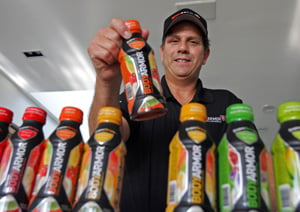
Lance Collins thinks he can catch lightning in a bottle a second time.
Collins sold Fuze Beverage to Coca-Cola Co. in 2007. Now he’s chief executive of another drink maker, BodyArmor Nutrition LLC in Beverly Hills. For his encore performance with BodyArmor Superdrinks, he has teamed up with Mike Repole, a New York-based entrepreneur who sold VitaminWater to Coke for $4.1 billion the same year Collins sold Fuze for an undisclosed amount.
Two weeks ago, Repole became chairman of BodyArmor and made a significant investment in the company. Now, Collins and Repole, longtime friends and one-time competitors, share the goal of turning BodyArmor into a brand with annual sales of $1 billion or more. Collins said Repole has given his product an important vote of confidence.
“After he sold VitaminWater, he said he would never get into the beverage business again,” Collins said. “That was his legacy and he figured he could never outdo it. Then he saw what I was doing with BodyArmor.”
Repole noted that the beverage industry produces a billion-dollar product once each decade: Gatorade in the 1970s, Snapple in the 1980s, Red Bull in the 1990s and VitaminWater most recently.
“I’m thrilled about the potential for BodyArmor with consumers, retailers and distributors, as there has been a huge innovation void in the beverage industry over the last 10 years,” he said in a statement.
BodyArmor’s six flavors are based on coconut water and contain anti-oxidants, electrolytes, amino acids and vitamins. Collins explained that while competing health drinks offer one or two of those ingredients, BodyArmor has them all. He called the product BodyArmor to tout the drink’s health benefits.
BodyArmor is more expensive than other health drinks, but Collins said consumers would have to buy three bottles of competing products to get the same nutritional value. A bottle of BodyArmor sells for $1.99 in supermarkets and $2.49 in convenience stores. By comparison, a bottle of One Natural Experience, another coconut-based drink made in Los Angeles, sells for $1.49 and a similar bottle of Gatorade sells for about $1.08, according to data from price-comparison site Nextag.com.
Collins has assembled a team of executives, most of whom previously worked for Fuze or VitaminWater, to market the product. Distribution began in May in Los Angeles at Gelson’s, a few upscale independent grocery shops and fitness gyms. By the end of 2011, the territory had expanded to all of California and seven other Western states in 7-Eleven and am/pm convenience stores, and some supermarkets. On Jan. 9, the product launched in New England and the Middle Atlantic states. Collins expects to fill in the middle of the country by the end of 2014.
BodyArmor has raised about $23 million through private stock placements to fund operations. Investors include Lew Frankfort, chief executive of New York handbag maker Coach Inc.; several early investors and executives at Zappos.com, a Las Vegas-based shoe-selling website; and Repole, who is working as an on-call consultant with BodyArmor management.
Jeff Hilton, co-founder of Integrated Marketing Group in Salt Lake City, a marketing agency that specializes in health-oriented brands, said BodyArmor is positioned in the functional food category, defined as foods that contain chemicals designed to produce a specific health benefit.
However, BodyArmor faces a challenge in the marketplace. Beverage buyers don’t spend a lot of energy researching the nutritional value of drinks.
“Most consumers don’t think that much about a beverage,” Hilton said. “It’s an impulse decision.”
Also, while BodyArmor is well-capitalized and has two veteran entrepreneurs behind it, the fact remains that about 85 percent of new functional food products fail, he added.
“The shelves are so crowded,” he said, “and there are lots of corpses on the side of the road.”
Friendly rivalry
Collins first met Repole in 1994 in the waiting room of a beverage distributor headquarters in New York. They immediately struck up a friendship despite working for different water companies at the time.
In 1997, Repole teamed up with inventor Darius Bikoff to launch VitaminWater. In 2001, when Collins developed the formula for vitamin-enriched fruit drink Fuze in his basement in Englewood, N.J., he and Repole became rivals for the next six years.
After Collins sold Fuze to Coca-Cola in 2007, he worked as a part-time consultant for Coke and played golf for three years until his noncompete clause ended. During that time, he moved to Los Angeles because his former wife lives here and they share custody of their daughter.
Once the noncompete lapsed, Collins cooked up the BodyArmor Superdrink formula and launched the company from his Beverly Hills home in May. Currently, the company has 34 employees at its Beverly Hills office and City of Industry manufacturing plant.
Meanwhile, Repole created two companies he’s still involved with: Energy Kitchen Inc., a healthy fast-food chain headquartered in New York, and Pirate Brands, the Seacliff, N.Y., maker of the Pirate’s Booty line of natural snacks.
Collins said he always wanted Repole involved in the company, and negotiations began in May, but they didn’t formalize the investment until this month.
Looking forward, Collins expects it will take five years to reach the $1 billion-in-sales mark, at which time he’ll decide whether to sell to a strategic buyer, take the company public or turn it into a long-term cash cow.
